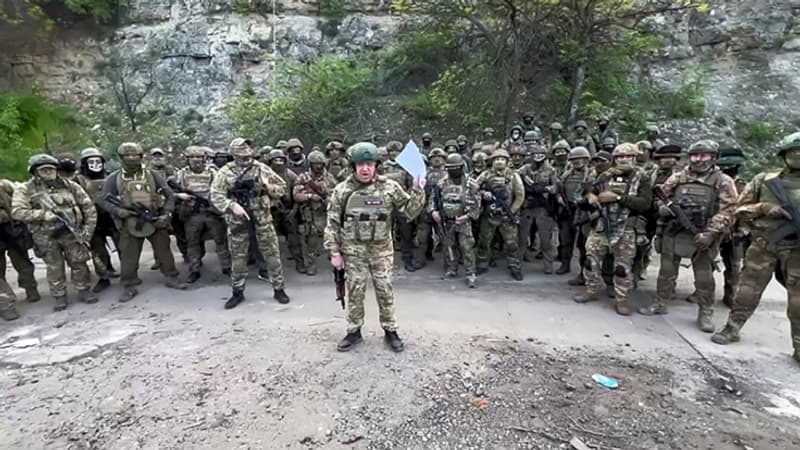24 hours of destabilization of the Kremlin. After the rebellion of the leader of the Wagner paramilitary group Evgeny Prigokhine led on Friday and Saturday against the Kremlin, the future of the militia remains uncertain. If some of the fighters could join the ranks of the Russian regular army, the departure of all these men would constitute a loss for Moscow.
>> Follow the news of the situation in Russia on our direct
“A Spearhead in Bakhmout”
In a few months, the private militia, at the service of Moscow, took a crucial place in the conflict, highlighting its leader with a sulfurous past Evgeny Prigojine.
So much so that “Russia can’t do without (Wagner)” now, says General Jérôme Pellistrandi, defense consultant for BFMTV.
“Wagner was really the spearhead (of the fights) during the spring to try to conquer Bakhmout,” he says in particular.
“Violent” and “experienced” fighters
The number of men belonging to this group and present on the Ukrainian front is currently uncertain. Yevgeny Prigojine claims 25,000 men, others speak of only 5,000.
“The truth is between the two,” said General Pellistrandi.
Either way, that’s potentially thousands of hands fewer for Moscow’s forces. Especially since Wagner’s men, a conglomerate of volunteers and ex-prisoners, are “expert”, “violent” and “experienced” fighters. Our Defense advisor assures that they are essential due to “their brutality”, as they do not obey the rules of a classic army.
A “long-term” deficiency
Should we then expect a turning point in the conflict now? On the ground, the loss of these men, while Russia generally manages to hold their positions, will not necessarily be felt immediately, according to General Pellistrandi.
The situation has not really changed at the moment at the front. The Ukrainians keep running into enemy defense lines and the Ukrainian Defense Minister has only claimed 1-2km advances on her latest point.
However, the loss of Wagner could be a more “long-term” issue if the conflict continues, our Defense consultant believes.
A valuable presence in Africa
Yevgeni Prigojine’s fighters are also proving a necessary force for Moscow in Africa and South America, where Wagner is present.
“They have at least 5,000 men in the Central African Republic, Mali, Libya, Syria. It is (Prigojine) who has connections (in the place),” recalls journalist Alexandra Jousset on BFMTV, co-director of the documentary “Wagner, the Shadow Army”. of Putin’.
If Wagner’s men ever joined the regular army, the situation would change a great deal in this part of the world. “What do you do if you reinstate Wagner’s soldiers? Are you saying that it is officially Russia that will help these (African) states? Today, we are not saying that it is Russia, but a private military company,” he said.
If they are not integrated, these men could also find themselves “alone” and could simply decide to leave and therefore Russia would no longer be present in this part of the world.
Uncertain integration into the regular army
As for the future of mercenaries, their integration is, on the one hand, uncertain. “Everything will depend on what Moscow brings to the table to attract Wagner to the regular army,” said Jérôme Pellistrandi, recalling in passing that these men initially chose to work for a private company and therefore fight against pay.
On the other hand, it is not guaranteed that their integration into the regular army will necessarily be easy. “Among the 25,000 men, there were 15,000 who were prisoners and were not that motivated, but there are 10,000 who are galvanized people, almost fanatics, who have been there for a long time. There are quite a few who believe in their leader (Evguéni Prigojine)”, underlines Alexandra Jousset.
These men are also not used to responding to a classic military hierarchy and discipline, different from that of a militia. Therefore, the transition does not seem “simple”, according to General Pellistrandi.
Source: BFM TV


